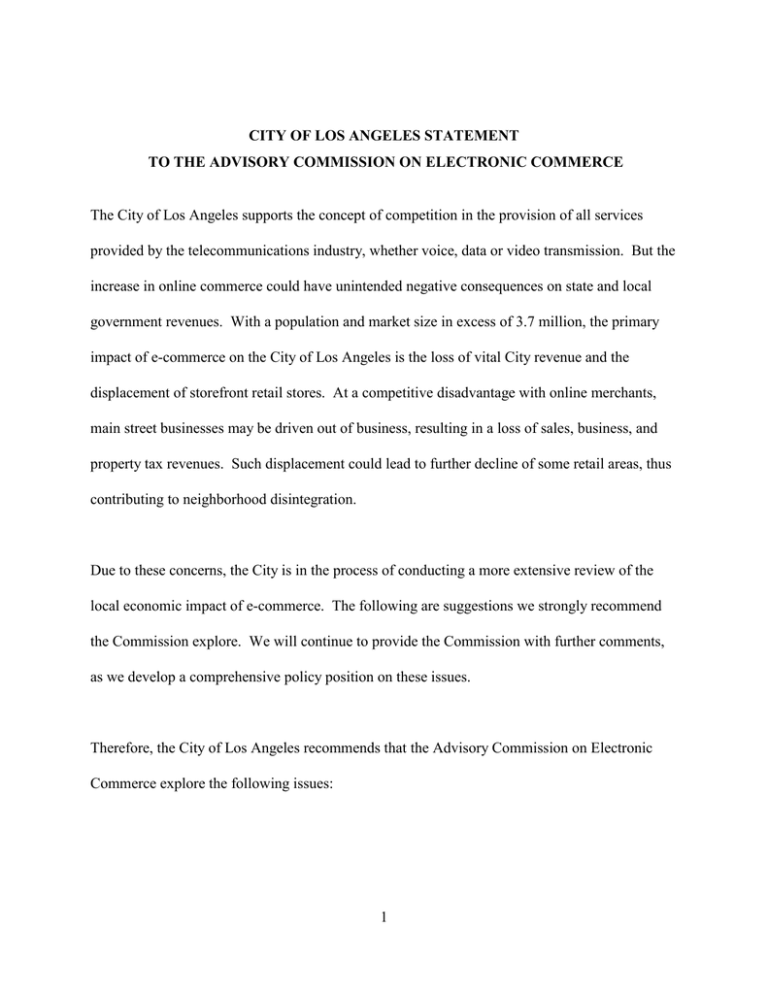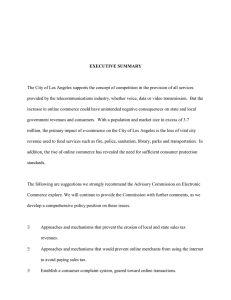The City of Los Angeles supports the concept of competition... provided by the telecommunications industry, whether voice, data or video... CITY OF LOS ANGELES STATEMENT
advertisement

CITY OF LOS ANGELES STATEMENT TO THE ADVISORY COMMISSION ON ELECTRONIC COMMERCE The City of Los Angeles supports the concept of competition in the provision of all services provided by the telecommunications industry, whether voice, data or video transmission. But the increase in online commerce could have unintended negative consequences on state and local government revenues. With a population and market size in excess of 3.7 million, the primary impact of e-commerce on the City of Los Angeles is the loss of vital City revenue and the displacement of storefront retail stores. At a competitive disadvantage with online merchants, main street businesses may be driven out of business, resulting in a loss of sales, business, and property tax revenues. Such displacement could lead to further decline of some retail areas, thus contributing to neighborhood disintegration. Due to these concerns, the City is in the process of conducting a more extensive review of the local economic impact of e-commerce. The following are suggestions we strongly recommend the Commission explore. We will continue to provide the Commission with further comments, as we develop a comprehensive policy position on these issues. Therefore, the City of Los Angeles recommends that the Advisory Commission on Electronic Commerce explore the following issues: 1 Taxation The loss of sales tax revenues would dramatically impact state and local governments. The state General Fund’s second largest revenue source is the sales and use tax, which accounts for about one-third of the General Fund revenue total. Fifty-two percent of the state’s General Fund is used to finance education in California. As much as $1.78 billion of California’s sales and use tax revenues are used to fund local public safety. The City estimates that this fiscal year’s sales tax will total $320 million, the City’s fourth largest revenue source. If, for example, the shift of commerce from main street businesses to the internet is 20%, then Los Angeles could face a decline in sales tax revenue of $64 million. This substantial source of City revenue traditionally pays for vital city services such as fire, police, sanitation, library, parks and transportation. A companion decline in retail centers or main street would also bode ill for neighborhood attractiveness. As a result, the City opposes the depletion of sales tax revenues. We recommend that the Advisory Commission explore the following as they relate to online purchases: · Approaches and mechanisms that prevent the erosion of local and state sales tax revenues. · Approaches and mechanisms that would prevent online merchants from using the internet to avoid paying sales tax. Consumer Protection 2 Problems associated with electronic sales and direct marketing have also become more prevalent with the rise of e-commerce. Therefore, the City is also supportive of maintaining effective consumer protection standards for its residents. We propose the following to address consumer concerns: · The establishment of a consumer complaint system, geared toward on-line transactions. Individuals could report credit card number theft or misuse and privacy invasion. The consumer complaint system could also address internet fraud cases in the event of noncompliance or non-performance of service agreements by e-commerce merchants. Further requirements could be put in place such as: full disclosure of product characteristics to consumers; information for a consumer to exercise a refund option; and clearly stated terms of an agreement provided to a consumer prior to a transaction. The elements addressed in the above simply provide a cursory overview of the issue. The City will continue to explore the policy and fiscal implications of e-commerce at the local level. 3



